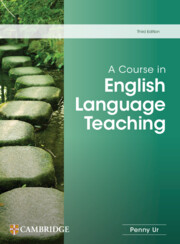Book contents
- Frontmatter
- Contents
- Acknowledgements
- Introduction
- 1 Teaching English today
- 2 The lesson
- 3 Classroom interaction
- 4 Tasks
- 5 Texts
- 6 Teaching vocabulary
- 7 Teaching grammar
- 8 Teaching listening
- 9 Teaching speaking
- 10 Teaching reading
- 11 Teaching writing
- 12 Feedback and error correction
- 13 Assessment and testing
- 14 The syllabus
- 15 Teaching/learning materials
- 16 Teaching content
- 17 Classroom discipline
- 18 Digital technology and online teaching
- 19 Learner differences 1: age
- 20 Learner differences 2: diversity and inclusion
- 21 Teacher development
- Glossary
- References
- Index
19 - Learner differences 1: age
Published online by Cambridge University Press: 15 March 2024
- Frontmatter
- Contents
- Acknowledgements
- Introduction
- 1 Teaching English today
- 2 The lesson
- 3 Classroom interaction
- 4 Tasks
- 5 Texts
- 6 Teaching vocabulary
- 7 Teaching grammar
- 8 Teaching listening
- 9 Teaching speaking
- 10 Teaching reading
- 11 Teaching writing
- 12 Feedback and error correction
- 13 Assessment and testing
- 14 The syllabus
- 15 Teaching/learning materials
- 16 Teaching content
- 17 Classroom discipline
- 18 Digital technology and online teaching
- 19 Learner differences 1: age
- 20 Learner differences 2: diversity and inclusion
- 21 Teacher development
- Glossary
- References
- Index
Summary
Differences between younger and older learners
It is commonly assumed that young children learn languages better than older ones. This is largely based on the observation that in immigrant families, young children normally become – apparently effortlessly – highly proficient in the new language. Research on children who did not have the opportunity to acquire language at an early age (‘wolfchildren’, or congenitally deaf children who recovered their hearing at a late age) indicate that they found it very difficult to learn it later. According to the critical period hypothesis (CPH), young children have a natural ability to learn languages which deteriorates when they get older; though when exactly this critical period ends is a subject of debate.
The CPH has been the subject of much controversy and criticism (see, for example, Marinova-Todd et al., 2000). In any case, the evidence summarized above has commonly been used to justify starting foreign-language instruction in schools as early as possible; but this conclusion is not in fact supported by the research. A longitudinal study of children learning English in Barcelona comparing early with late starters in English courses in schools showed that even given the larger number of total hours that younger beginners had studied, their ultimate achievement was no better than that of the older beginners (Muñoz, 2006). This result corresponds to the findings of Swain and her colleagues in extensive studies of students in immersion courses in Canada (Swain, 2000).
Pause for thought
What are your own feelings about starting English lessons early in schools?
Comment
In my country, English lessons are increasingly introduced – usually one or two a week – in the early years of primary school, while all the rest of the curriculum is taught in another language. When I ask the question on the previous page, I get a lot of different answers, depending on who is being asked. Parents, school principals, teachers of other subjects usually assume that starting English early in schools is a good thing. The majority of English teachers and other ELT professionals, on the other hand, are strongly opposed. Their opposition is not only because of the reasons given below, but also because the teachers who are leading these English lessons are usually not English teachers, but the class homeroom teachers. These may or may not be fluent in English and in any case do not have much knowledge of effective language-teaching procedures.
- Type
- Chapter
- Information
- A Course in English Language Teaching , pp. 262 - 276Publisher: Cambridge University PressPrint publication year: 2024

